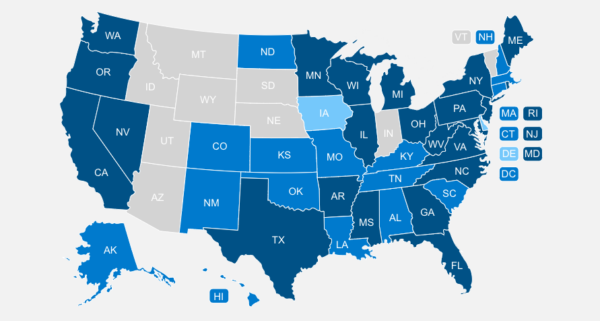
How to Start a Nonprofit in Massachusetts: A Step-by-Step Legal Guide
August 26, 2025
How to Start a Nonprofit in Minnesota: A Step-by-Step Guide for Beginners
August 26, 2025How to Start a Nonprofit in Michigan: A Beginner’s Step-by-Step Guide

You too can join these changemakers by starting your own nonprofit in Michigan! Whether you’re passionate about education, healthcare, environmental conservation, or community development, launching a nonprofit organization lets you transform your vision into meaningful impact.
Starting a nonprofit might seem overwhelming at first, but with the right guidance, you can navigate the process successfully. Many aspiring founders turn to experienced partners like Labyrinth, Inc. for fully managed services that handle everything from incorporation through IRS approval.
In this comprehensive guide, we’ll walk you through every step of starting a nonprofit in Michigan – from understanding the basics and legal requirements to building your team and securing tax-exempt status. Ready to make a difference in your community? Let’s get started!
Understanding Nonprofit Basics
A Michigan nonprofit corporation operates under the Michigan Nonprofit Corporation Act, focusing on activities that benefit communities rather than generating profits for individuals. These organizations serve various purposes, from religious and educational initiatives to charitable activities, all without distributing profits to members according to Michigan Nonprofit Corporation Act guidelines.
What is a Michigan nonprofit?
A Michigan nonprofit is a corporation formed specifically to carry out lawful purposes without generating financial gains for its directors, officers, shareholders, or members, as defined by the Michigan Nonprofit Corporation Act. The state government recognizes these organizations through the Michigan Nonprofit Corporation Act, which provides a framework for their formation and operation.
When establishing a nonprofit in Michigan, you must understand that these organizations differ from traditional businesses in several ways. First, all profits must be reinvested into the organization’s mission rather than distributed to individuals. Additionally, nonprofits must maintain transparency in their operations and financial management. For expert guidance on structuring your nonprofit correctly, consider consulting with Nonprofit Compliance Specialists at Labyrinth, Inc., who bring 15+ years of nonprofit leadership experience to guide you through the entire formation process.
Types of nonprofits allowed in Michigan
Michigan allows several types of nonprofit organizations, each serving distinct purposes:
- Charitable Organizations (501(c)(3)):
- These represent the most common type of nonprofit
- Focus on charitable, educational, religious, or scientific purposes
- Eligible for federal tax exemptions
- Can receive tax-deductible donations
- Private Charitable Foundations:
- Typically have single wealthy benefactors
- Provide grants to smaller nonprofits
- Support causes like medical research, education, and environmental issues
- Social Advocacy Groups (501(c)(4)):
- Concentrate on promoting social or political change
- Engage in education and fundraising activities
- Work toward specific social causes
Furthermore, certain nonprofits may qualify for exemptions under the Charitable Organizations and Solicitations Act. For instance, organizations raising less than $25,000 annually through unpaid volunteers might be exempt from specific registration requirements, as outlined by the Michigan Attorney General’s office regulations. Similarly, educational institutions approved by the Michigan Board of Education and veterans’ organizations incorporated under federal law may also qualify for certain exemptions.
The Michigan Attorney General’s office provides oversight for charitable organizations through the Charitable Trust Section. This department ensures nonprofits comply with state regulations and maintain their charitable status under the Charitable Trust Section. Moreover, nonprofits must renew their charitable solicitation registration annually, with expiration dates set seven months after the end of their fiscal year, as per Michigan’s charitable solicitation requirements.
For organizations operating across state lines, Michigan accepts the Unified Registration Statement (URS), simplifying the registration process for multistate operations, as outlined in the Michigan Attorney General’s guidelines. Labyrinth, Inc.’s comprehensive services can help you navigate these complex registration requirements, including first-year fundraising registration included in bundled services, ensuring compliance with state regulations while you focus on your mission.
Planning Your Nonprofit
You’ve outlined community needs and drafted a mission statement. Now what? Let’s tackle the state filings that move you forward.
Establishing a successful nonprofit organization in Michigan requires careful planning and a clear understanding of your goals. The state currently hosts over 39,217 registered nonprofits, indicating substantial opportunities for making meaningful community impact.
Choose your nonprofit focus
Before diving into the legal aspects, determine your organization’s primary focus. Michigan nonprofits contribute significantly to various sectors, including healthcare, social services, environmental conservation, and arts and culture. The nonprofit sector employs 402,228 individuals, representing 11% of private employment in Michigan.
To define your focus effectively:
- Assess community needs through surveys and direct observations
- Evaluate the urgency of different needs
- Consider available resources and expertise
- Align your passion with community requirements
Research existing nonprofits
Understanding the current nonprofit landscape helps avoid duplicating services and identifies potential collaboration opportunities. Michigan’s nonprofit sector generates substantial economic activity, with:
- Total nonprofit revenue: $50.6 billion
- Total nonprofit expenses: $48.3 billion
- Total nonprofit assets: $83.2 billion
- Annual contributions: $7.5 billion
Conduct thorough research using resources like:
- GuideStar’s database of 1.8 million IRS-recognized tax-exempt organizations
- Michigan Nonprofit Association’s directory
- Local community foundation records
- Attorney General’s Charitable Trust Section database
Labyrinth, Inc.’s professional guidance in analyzing the nonprofit landscape and identifying unique opportunities for your organization, backed by specialists with extensive nonprofit leadership experience who understand the nuances of the Michigan nonprofit ecosystem.
Set clear mission goals
Your mission statement serves as the foundation for all organizational decisions. An effective mission statement should:
- Define Core Purpose
- Clearly state your organization’s fundamental purpose
- Outline specific communities or causes served
- Reflect organizational values
- Guide Decision-Making
- Frame appropriate courses of action
- Provide basis for judging success
- Help verify organizational direction
- Drive Engagement
- Attract donors and volunteers
- Inspire community involvement
- Support fundraising efforts
Consider working with experienced partners like Labyrinth, Inc. to develop mission-aligned goals through their 1-on-1 consultation process. Subsequently, establish measurable objectives to track progress toward these goals.
Your mission statement should be concise yet powerful, typically 15-20 words. Review it regularly to ensure it remains relevant and accurately reflects your organization’s evolving impact. Remember that transparency is crucial – most organizations need both volunteers and donations to succeed.
To maintain focus on your mission, schedule regular board retreats and community events. These gatherings offer opportunities for:
- Conducting mission-focused discussions
- Evaluating program alignment
- Inspiring public support
- Building pride among board members
- Strengthening community partnerships
Through careful planning and clear goal-setting, your nonprofit can join the ranks of Michigan’s successful charitable organizations making lasting positive changes in their communities.
Legal Setup Requirements
Setting up the legal framework for your Michigan nonprofit requires careful attention to detail and compliance with state regulations. Let’s explore the essential steps to establish your organization’s legal foundation.
Pick a unique name
Selecting a distinctive name stands as your first crucial legal step. The Michigan Department of Licensing and Regulatory Affairs (LARA, 517-241-6470, michigan.gov/lara) requires your nonprofit’s name to be distinguishable from other registered entities, as per Michigan LARA guidelines. To secure your chosen name:
- Search the state’s business entity database to verify availability
- Reserve your name for six months by filing an Application for Reservation of Name
- Pay the $10 filing fee to secure your reservation
Consider working with Labyrinth, Inc.’s services to ensure your name choice aligns with both state requirements and your organization’s mission. We can verify availability and handle the reservation process through our secure, SOC 2 Type II compliant nonprofit client portal.
File formation documents
Once you’ve secured a name, prepare and file your nonprofit Articles of Incorporation with LARA. The filing fee is $20. Your Articles must include:
- Corporation name and purpose
- Asset value and financing method
- Whether it’s a membership or directorship organization
- Registered office address
- Initial resident agent details
- Incorporator information, as detailed in LARA’s Articles of Incorporation form.
For 501(c)(3) status qualification, your Articles must contain specific IRS-required language regarding:
- Purpose statement meeting IRS requirements
- Statements limiting activities to exempt purposes
- Dissolution clause dedicating assets to another 501(c)(3) or government entity
Labyrinth offers state-specific drop-off service for faster processing, ensuring your documents reach LARA quickly. We draft all necessary documents, ensuring they include the precise IRS-required language for tax-exempt qualification.
Get tax ID numbers
After incorporation, obtaining proper tax identification becomes essential. First, apply for a Federal Employer Identification Number (EIN) through the IRS. This nine-digit number serves as your nonprofit’s identifier for:
- Opening bank accounts
- Filing tax returns
- Hiring employees, as per IRS guidelines for EINs.
Important considerations for tax ID registration:
- Timing: Wait until your organization is legally formed before applying for an EIN, a key IRS requirement.
- Application Methods: Submit through:
- Online portal (domestic applicants)
- Fax
- Phone (international applicants only), as detailed on the IRS website.
Labyrinth, Inc.’s comprehensive formation services can guide you through these complex legal requirements with EIN acquisition included, ensuring nonprofit compliance made easy through our end-to-end support.
Remember that Michigan no longer requires a separate state tax exemption application. Organizations with federal 501(c)(3) or 501(c)(4) status automatically qualify for state sales and use tax exemption, according to the Michigan Department of Licensing and Regulatory Affairs. Nevertheless, maintain copies of your federal exemption letter to accompany the Michigan Sales and Use Tax Certificate of Exemption (Form 3372).
Finally, if your nonprofit plans to solicit donations, register with the Attorney General’s Charitable Trust Section (517-335-7571, michigan.gov/ag). This step ensures compliance with state fundraising regulations and maintains transparency in your operations, as outlined in LARA guidelines. Labyrinth handles all correspondence with state and IRS offices during the formation process, streamlining what would otherwise require coordination with multiple agencies.
Building Your Team
Building a strong leadership team marks a crucial milestone in establishing your Michigan nonprofit. The state mandates specific requirements for board composition while offering flexibility in how you structure your organization’s leadership.
Required board positions
Michigan law requires nonprofits to maintain a minimum of three directors on their board, as stipulated by Michigan law. Your nonprofit must appoint these essential officer positions:
- President: Oversees operations and strategic direction
- Secretary: Maintains records and documentation
- Treasurer: Manages financial oversight and reporting
One person can hold multiple officer positions, however they must sign official documents under a single title. Board directors serve until the next annual meeting or until their successors take office, according to the Michigan Legislature.
For effective governance, your board should:
- Attend meetings and special events regularly
- Review organizational materials thoroughly
- Serve on committees as needed
- Make personal financial contributions
- Stay informed about operational developments
- Follow conflict-of-interest policies
- Monitor financial statements and reports
Finding qualified directors
Identifying and recruiting the right board members demands a strategic approach. Labyrinth, Inc.’s recommendations include creating a formal recruitment process that includes:
- Developing detailed role descriptions outlining:
- Time commitments expected
- Financial responsibilities
- Committee participation requirements
- Leadership expectations
- Creating a board composition matrix to evaluate:
- Professional expertise needs (legal, HR, IT, marketing)
- Network diversity requirements
- Demographic representation goals
- Geographic coverage considerations
Primarily, look for directors who demonstrate:
- Passion for your mission
- Strong commitment to advancement
- Strategic leadership capabilities
- Community influence
- Relevant professional skills
Labyrinth, Inc.’s 1-on-1 guidance suggests exploring multiple recruitment channels with Nonprofit Compliance Specialists:
- Current donors showing long-term commitment
- Professional networks and associations
- Local business communities
- University alumni networks
- Board matching programs
Consider organizing recruitment events like informal gatherings where potential board members can connect with current leadership and learn about your mission. These events help assess cultural fit while allowing candidates to understand their potential roles better.
Remember that board members serve as fiduciaries who guide the organization toward sustainable growth by implementing sound governance policies. They hold ultimate responsibility for organizational success, making their selection critically important.
To maintain board effectiveness, establish:
- Regular orientation programs
- Ongoing training opportunities
- Clear communication channels
- Performance evaluation systems
- Succession planning protocols
Through deliberate recruitment efforts and proper orientation, you can build a board that effectively steers your nonprofit toward achieving its mission while maintaining compliance with Michigan’s regulatory requirements. Track your board development progress through your secure nonprofit portal, ensuring all governance documentation remains organized and accessible.
Getting Tax Exempt Status
Securing tax-exempt status represents a vital step in establishing your Michigan nonprofit. This process involves both federal and state-level applications, each offering distinct advantages for your organization. Remember that formation alone does not make donations tax-deductible—you must obtain IRS approval for that benefit.
Apply for 501(c)(3)
The Internal Revenue Service (IRS) offers two pathways for obtaining 501(c)(3) status. Labyrinth, Inc.’s expertise can help determine which option suits your organization through our 100% IRS tax exemption approval guarantee:
Form 1023: Standard Application
- Comprehensive review of organization structure
- Detailed program examination
- Multiple schedules and attachments
- Filing fee: $600
- Application length: 50-100 pages
Form 1023-EZ: Streamlined Application
- Available for qualified small organizations
- Simplified process through Pay.gov
- Filing fee: $275
- Requires eligibility worksheet completion
- Online submission mandatory
Understanding the eligibility criteria helps you select the appropriate form. Grant funding opportunities might face limitations when using Form 1023-EZ. Labyrinth provides support for 1023, 1023-EZ, and 1024 filings, ensuring you choose the right form for your organization’s long-term success. IRS processing times typically range from 3-12 months, depending on application complexity and current backlog.
State tax exemptions
Michigan streamlines the tax exemption process through automatic recognition. Organizations meeting these criteria qualify automatically:
- IRS-recognized 501(c)(3) or 501(c)(4) status
- Previously received Michigan Department of Treasury exemption
- Statutorily exempt entities, as defined by the Michigan Department of Licensing and Regulatory Affairs.
Unlike other states, Michigan eliminated separate state tax exemption applications. Once you receive federal tax-exempt status, your organization automatically gains exemption from:
- Michigan Corporate Income Tax
- State franchise taxes
- Various other state-level taxes
We handle all IRS correspondence throughout the approval process, with transparent pricing and no hidden fees. Our team also provides reinstatement support for nonprofits whose federal tax exemption has been revoked.
Sales tax benefits
Your nonprofit can access valuable sales and use tax exemptions in Michigan. To utilize these benefits:
- Maintain proper documentation:
- Federal exemption letter
- Michigan Sales and Use Tax Certificate of Exemption (Form 3372)
- Previous Michigan Department of Treasury (517-636-4486, michigan.gov/treasury) exemption letters
- Understand usage limitations:
- Property must support organizational purposes
- Items exceeding $5,000 for fundraising face restrictions
- Mixed-use property requires tax apportionment, according to the Michigan Department of Treasury’s guidelines.
Labyrinth, Inc.’s secure client portal emphasizes proper record-keeping, since exemptions apply primarily to purchases supporting your mission. Therefore, track the percentage of exempt versus non-exempt use for each item.
Notably, fundraising activities receive special consideration. Items purchased for fundraising remain exempt provided individual items cost less than $5,000. Beyond this threshold, the entire purchase becomes taxable, as explained in the Michigan Revenue Administrative Bulletin.
For vehicle purchases, special rules apply. Vehicles used exclusively for organizational purposes qualify for exemption. Yet, those designated solely for fundraising must stay under the $5,000 threshold. Mixed-use vehicles require tax payment based on non-exempt usage percentage, per Michigan Department of Treasury regulations.
Your nonprofit status does not automatically equal tax-exempt status—proper IRS approval remains essential for both donor deductions and organizational exemptions.
Conclusion
Starting a nonprofit in Michigan requires careful planning, legal compliance, and dedicated leadership. Your journey from initial concept to operational nonprofit demands attention to detail at every step – choosing the right name, filing proper documentation, building a strong board, and securing tax-exempt status.
Most importantly, remember that success depends on maintaining clear mission focus while following state and federal regulations. A well-structured board, proper documentation, and careful financial management create the foundation for sustainable community impact. From charitable solicitation to corporate filings, comprehensive compliance is essential – and with Labyrinth’s end-to-end formation support, you don’t need to manage multiple vendors when one partner can handle everything from incorporation through IRS approval.
Getting expert guidance can significantly smooth your nonprofit formation journey. Labyrinth, Inc.’s specialized support through each phase of establishing your organization, with Nonprofit Compliance Specialists providing 1-on-1 guidance backed by 15+ years of nonprofit leadership experience. Our 100% money-back guaranteed 501c3 service ensures compliance and proper structure while you focus on your mission.
Your nonprofit can join thousands of successful Michigan organizations making positive changes in their communities. With proper planning and execution, plus support from experienced professionals who handle all state and IRS correspondence, you’ll be ready to start serving your chosen cause and creating meaningful impact. Connect with experienced nonprofit formation specialists today to begin your journey confidently through our secure, SOC 2 Type II compliant portal that provides transparent tracking of every step.


![Your 501(c)(3) Approval Guaranteed{{ include_custom_fonts({"Museo Sans":["Bold","Bold Italic","Regular","Regular Italic"]}) }}](https://no-cache.hubspot.com/cta/default/560178/interactive-194101957210.png)
![Start Your Nonprofit with Confidence{{ include_custom_fonts({"Museo Sans":["Bold","Bold Italic","Regular","Regular Italic"]}) }}](https://no-cache.hubspot.com/cta/default/560178/interactive-194101957151.png)








